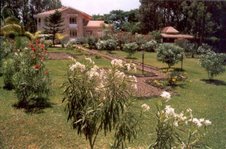Yesterday I had the opportunity to sit in on a hearing at the ICTR. The ICTR has four courts and they all have been on recess since I have been in Tanzania. Fortunately, all four trials resumed this week. The ICTR has completed 66 or so cases since its inception in the mid nineties. There are 18 current defendants. Most of the accused have been convicted and are serving prison terms; a few have been acquitted. This tribunal only hears cases against those who were in positions of leadership and authority in Rwanda at the time of the genocide. There are 8 more cases pending trial and the ICTR is supposed to close in 2008, but at the pace these trials are proceeding, I doubt they will make it.
The case we heard yesterday has been in session for four years. The accused are four men who were ministers in the transitional government in 1994 after the Rwandan president's plane was shot down. The person who was testifying (in his own defence) had been the minister of foreign affairs. The ministers of health, trade, and something else were his co-defendants. The courtroom is quite full as there are three judges who sit in the middle of the room, with assistants and court reporters around. Facing the judges, but with his back to the spectators sits the witness. There is a curtain that can conceal the witness in cases where witnesses must be protected. This witness/defendant was in full view of the spectators' section. Then there is a small army of prosecuting attorneys on the right and another small army of defense attorneys on the left, along with the other accused.
The attorney conducting the cross examination was an African-Canadian with a wry and satirical sense of humour who had the court guffawing on a number of occasions; however, his examination of the defendant was devastatingly serious and composed of two parts. First he establish (successfully) that the minister indeed was in a position of power at the time to stop the genocide, and then he focused on a speech the minister had given to the security council in early May 1994. It took about two hours to get all the information on the table because it is an extremely laborious process to conduct an international trial in three languages; there was a lot of paper shuffling so that everyone in the court were on the same page, etc.
We were all appalled when we finally heard the full contents of his speech, which included absolutely nothing about Tutsies being massacred, and created the impression that it was the Hutus who had been under attack by the Rwandan Liberation Front (can't remember exactly the the name of this group). Now, indeed, the RLF had been responsible for killing some Hutus somewhere in the country, at some time, but this speech, delivered 5 weeks after the genocide had started, completely covered up what was really going on in Rwanda. When he was questioned about not mentioning the Tutsi massacres, he stated that he had said "Hutus and others." it was realy unbelievable.
I think this guy is doomed and I hope he rots in prison for the rest of his life. There is a prison at the ICTR site where all of the accused live for the duration of their trials, and I read in the paper last night that prisoners there are all on a hunger strike now because there is talk of moving the final eight trials to Rwanda. They worry of course about getting a fair trial there.
It was quite moving to attend this trial and to see that these gross violations of human rights will not go unpunished.
Thursday, October 11, 2007
Subscribe to:
Post Comments (Atom)


No comments:
Post a Comment